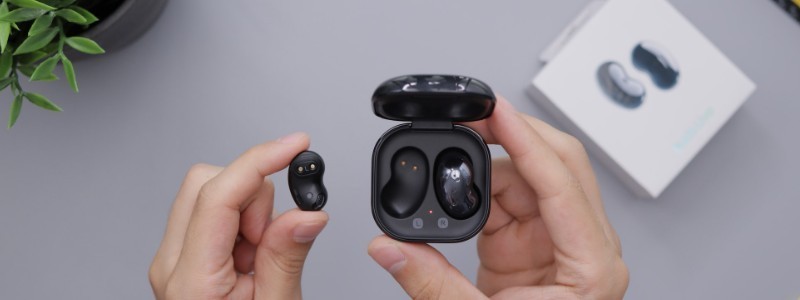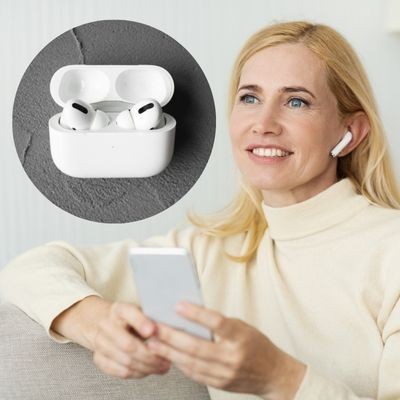
Head of Online Medical Content

Audiology Expert at Hearing Aid UK

Hearing Aids Versus Amplifiers
The difference between hearing amplifiers and hearing aids
Hearing aids vs hearing amplifiers – The reality
Even though they offer similar purposes, hearing amplifiers and hearing aids are two very different types of devices. Most budget-conscious people will be tempted to purchase a hearing amplifier even though these are not designed or intended for people with hearing loss.
From experience, a lot of people commonly ask whether hearing aids and amplifiers are the same and what is the difference between a hearing aid and an amplifier. Here we go through what these differences are, what you should be aware of, and the dangers of amplifiers before deciding which one is right for you.
What sets hearing aids and hearing amplifiers apart?
What is the difference between hearing amplifiers and hearing aids? Hearing aids are professional medical hearing devices that are recommended by an audiologist. They are designed to help people with hearing loss by amplifying sounds and making them more audible.
Hearing aids are typically more expensive than hearing amplifiers and include a manufacturer’s warranty.
They are also more sophisticated than hearing amplifiers, with a range of features and settings that can be customised. Hearing aids are professionally fitted by an audiologist, personalised, and fine-tuned to the wearer's hearing needs and specifics. This helps support hearing loss by boosting certain frequencies needed.
Even though the clue is in the name, hearing amplifiers are not hearing aids. This sometimes gets confusing, as some do look like hearing aids. Hearing amplifiers are not medical devices and are not to be worn all the time.
They are less expensive than hearing aids, can be bought over the counter or online, and do not come with any form of guarantee, like a manufacturer’s warranty.
They are also less sophisticated than hearing aids and do not offer advanced features or customisation options. This is because they are designed to boost environmental hearing for those without hearing loss by just making things louder, regardless of the frequency or volume needed by the wearer.
All sounds are amplified, unlike hearing aids, which are programmed for the specific frequencies that those with hearing loss need to hear. These specifics are shown on an audiogram after a hearing test.
Is avoiding the cost of hearing aids worth it by opting for amplifiers?
Are hearing amplifiers as good as hearing aids? Hearing amplifiers might, at first, seem like a straightforward way to cut costs and avoid the expense of digital hearing aids. Unfortunately, many misuse amplifiers when they really should be wearing hearing aids.
Hearing aids are complex hearing solutions, often with advanced technology features like artificial intelligence for ultimate personalisation and brain hearing technology to mimic the way our brain naturally hears, for a realistic sound experience.
Amplifiers just boost all sounds. So, you'll hear speech loud and background noise loud as well as other soundscapes - all at the same time. Here lies the danger, as you may have a hearing loss that needs specific focus on various listening challenges.
They cannot successfully support a hearing loss, especially a profound hearing loss, severe enough to require a powerful and intelligent hearing aid. Amplifiers do not require a prescription or hearing test and can be bought online. This is why they are commonly referred to as over-the-counter hearing aids or OTC hearing aids.
For example, frequency-specific hearing loss is not something that can be supported through the amplification of all sounds. If you wear an amplifier when you need the support of a hearing aid, it can be really dangerous for your future hearing health. In fact, in all circumstances, hearing amplifiers should not replace hearing aids.
This is simply because each person with hearing loss has a different degree of loss at different frequencies or pitches. The way you treat this loss is vital, as the sound you hear needs to be tailored and fine-tuned to your unique loss.

Hearing Aids vs Hearing Amplifiers
Understanding the dangers of choosing the wrong one
What is the deciding factor?
There are several key differences between hearing aids and hearing amplifiers that you should consider before deciding which one is right for you. Here are some examples of what consumers look for:
- Cost: Hearing aids are typically more expensive than hearing amplifiers. Hearing amplifiers, on the other hand, are generally less expensive.
- Prescription: Hearing aids are medical devices that are prescribed by an audiologist. Hearing amplifiers are not medical devices, do not require a prescription, and can be bought online.
- Customisation: Hearing aids are more sophisticated than hearing amplifiers and offer a range of features and settings that can be customised to the wearer's needs. Hearing amplifiers are less sophisticated and do not offer customisation.
- Efficacy: Hearing aids are designed to help people with hearing loss by amplifying sounds and making them more audible. Unlike amplifiers, they are a successful hearing solution.
The dangers of hearing amplifiers
We have spoken to patients before about their experience with hearing amplifiers and how they didn’t support their hearing. They were then left with a full amplification of all sounds that resulted in uncomfortable, loud sounds all the time, when they only needed support in some hearing situations that were particularly challenging for them.
Safe to say, they were not satisfied with their purchase.
This, unfortunately, mirrors many consumers and has the potential to further damage hearing. This is because the technology within hearing amplifiers offers an enhancement of all sound for those without hearing loss. Therefore, the hearing challenges you may have are not being solved, supported, or even recognised.
Amplifiers treat all hearing the same. A one-size-fits-all concept of sorts. This is why you should contact an audiologist for a professional hearing test that will diagnose any hearing loss. The difference between mild and severe hearing loss is not seeking the right help.
Never purchase a hearing amplifier because you are having trouble hearing. There might be an issue that will deteriorate over time if not treated. If, after a hearing test, hearing loss is detected, an audiologist will go through all the hearing solutions available to you. Only hearing aids will solve your hearing problems safely and efficiently.
Hearing aid amplifiers have the potential to damage your hearing by using unnecessary amplification of the sounds you can still hear.
Hearing aids vs hearing amplifiers - In conclusion
While hearing amplifiers and hearing aids seem similar initially, they could not be more different. One is meant for recreational use for those without hearing loss, while the other is a successful and recommended treatment for hearing loss.
Buying a hearing amplifier instead of a hearing aid might appear to be a good idea initially because it will save you money; however, in reality, it is going to do more harm than good. If you are unsure about how well you are hearing, contact an audiologist and have your hearing checked.
Why Choose Us?
- FREE Hearing Tests
- Best Hearing Aids and Prices
- FREE Aftercare for Life
- FREE Home Visits
- 200+ Local Audiologists
- 60 Day Money Back Guarantee
Sound amplifiers vs hearing aids
Think your hearing has changed? We can support you locally
If you want to know the difference between hearing aids and sound amplifiers or if you feel like your hearing has worsened - we advise that you check how well you're hearing with an audiologist as soon as you can.
For any support, advice or hearing healthcare enquiries, please call us free on 0800 567 7621
Other hearing aid advice articles you might like...
 Do Hearing Aids Work for Everyone?
Do Hearing Aids Work for Everyone?  Wearing Hearing Aids with Glasses
Wearing Hearing Aids with Glasses  Risks of Wearing Apple AirPod Pro 2's
Risks of Wearing Apple AirPod Pro 2's Our specialist service includes:
Do not spend hundreds of pounds without getting a second opinion from us.
Please call us on 0800 567 7621
 Not only are the prices great, but the service is fantastic! Many thanks to your team.
Not only are the prices great, but the service is fantastic! Many thanks to your team.What's included in our hearing aid prices?
Common FAQs about hearing aids versus hearing amplifiers
What are hearing amplifiers used for?
Hearing amplifiers are usually used by people without hearing loss who want basic support to hear faraway sounds.
Do hearing amplifiers work?
Hearing amplifiers work for the basic purpose they were designed for. They make all sounds louder and do not work for hearing loss.
Do hearing aids do more than just amplification?
They can be fully programmed for tailored amplification and focus on the sounds you are finding most challenging. This bespoke sound is not just for your hearing needs but can also adjust to the environment you are in.
Other pages you might find useful
Ask the Experts
6 Morton Lane
Walkwood
Redditch
Worcestershire
B97 5QA
Latest Launch
When we refer to a product as 'Latest Launch', we mean it is the latest to be released on the market.
New
When we refer to a product as 'New', we mean that the product is the newest hearing aid model on the market.
When we refer to a product as 'Superseded', we mean that there is a newer range available which replaces and improves on this product.
Older Model
When we refer to a product as an 'Older Model', we mean that it is has been superseded by at least two more recent hearing aid ranges.
